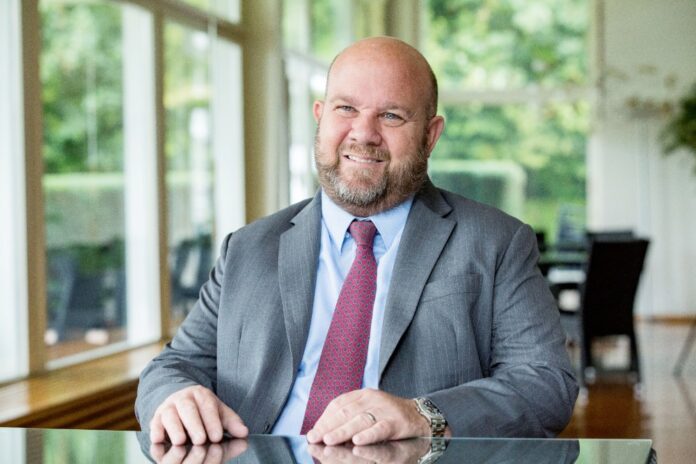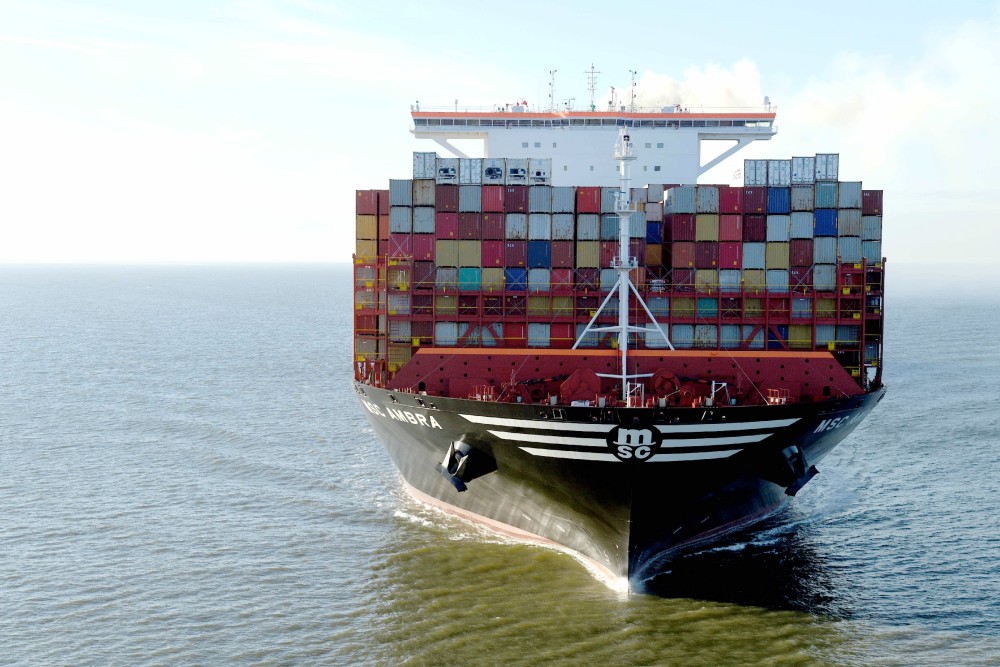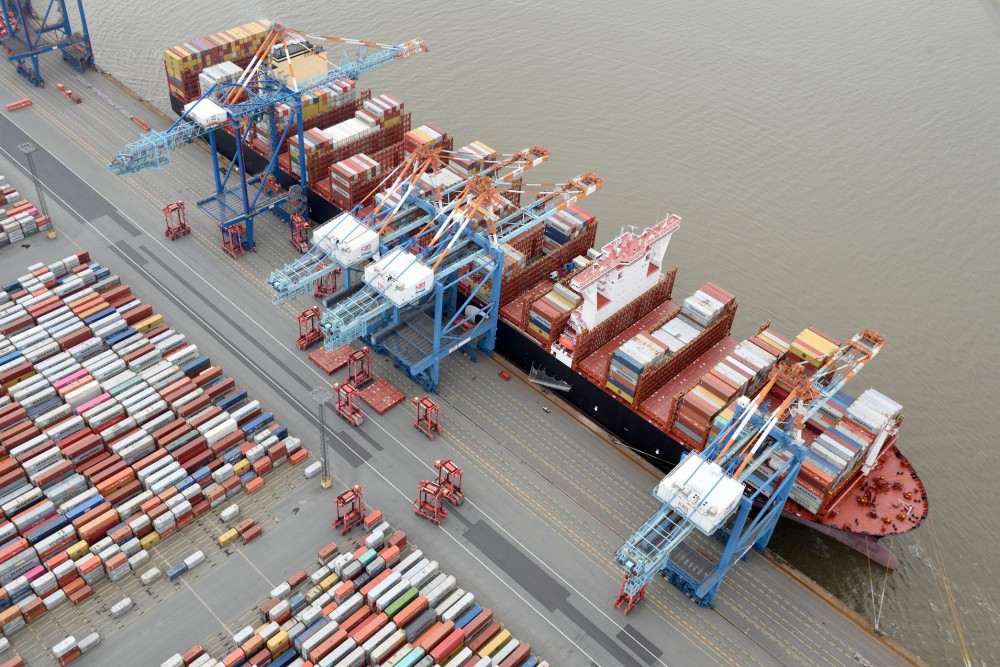
Executive Vice President Bud Darr represents MSC, the world’s leading liner company, in maritime policy and government affairs – for both the cargo and cruise branch. To accelerate decarbonization of shipping, more efforts are needed, he says in an interview with HANSA[ds_preview]
Mr. Darr, we are talking on the occasion of the German »Schifffahrtstag« in Bremen. What’s your impression of today’s conference and what was the reason for you to come to Germany?
Bud Darr: Germany is a very important market for us also, in particular, with regard to the environmental issues including decarbonization. So it was a good fit to spend some time with the local community and talk about things of mutual importance.
Sustainability has been one of the core topics if not the motto of today’s conference. What is the overall strategy of MSC when it comes to reaching climate goals, rebuilding the fleet and using alternative fuels?
Darr: We have a net-zero target for 2050. We will get there through the way we power our ships, not relying on external offsetting. We are making investments today, we are working on partnerships with current and future energy providers to make sure that we have a supply of multiple fuels, and we are also making advances on both the new and the existing fleet with regard to energy efficiency and technologies that can be used to improve that. Because every gramme of fuel that is not consumed today is 3.2 gramme of CO? that is not emitted in the atmosphere. We are working on all these topics simultaneously.
MSC was blamed several times by the NGO »Transport & Environment« for being one of most emission-producing companies in the world. How do you comment on this?
Darr: These arguments have something true about it. But, the demand for our services has grown strongly. That’s how we moved from number 2 to number 1, to become the largest liner carrier in the world. So there is a lot of fuel consumed and GHG emitted in our network. But on a per-unit-basis for carbon intensity we have consistently make improvements over time and we continue to make improvements. The real break-through for us is going to come through alternative fuels, which are not yet available.
The other thing is: the data that is relied upon for some of these comments were made for Europe, and we have a really big physical footprint in Europe. And we tend to operate a very large proportion of our own ships in our own feeder network – not all of our competitors do that. And lastly, I would say, the idea of taking an aggregate of hundreds of ships is really an unreasonable comparison to a single stationary power plant. It’s really apples and oranges. We saw a decrease in EU reported absolute emissions in our fleet of 2.5% as published in 2022, compared to what was published in 2021. That should be the real story.
So those claims don’t have any impact on your strategy?
Darr: No, they don’t. We can’t be driven around by what third parties, that are not our customers, are saying. We are driven by what we think, by what our customers think and by what the society thinks with respect to the regulatory frameworks. It all leads us towards keeping focused on what we really want to be, and that is decarbonization by 2050.
MSC has been number 1 in the liner business for about a year now. Does this mean for you that you have to take the lead and to become one of the driving forces in decarbonizing the shipping industry?
Darr: We are the number one and we do need to lead and we do need to show a good example. And we are doing that. What we don’t do is talk about everything publicly. I can assure you that we consider all of the solutions that are being discussed by others. We are investing heavily in new ships and technologies, we were also very active and influential inside the shipping community, in bodies like the International Chamber of Shipping or Bimco.

MSC has acquired an enormous number of secondhand vessels in recent months. These are obviously not as green as newbuildings would be. Do you want to keep them for the long run, to refit them in order to comply with new environmental standards or will you scrap them in due time?
Darr: The market conditions over the last 24 months have been extraordinary and some of the market dynamics led to the decision to grow our fleet both through purchasing secondhand tonnage – which mostly was on charter to our network anyway – and also with regard to newbuildings. As we all know, capacity was badly needed to accommodate the congestion that happened all around the world.
What we will do over time is conduct fleet renewal to make sure that our overall GHG picture is on the trajectory we need it to be. And then it will be a combination of balancing new ships with the existing fleet and picking the right ones that may have good retrofit options, rather sooner than later, while others will be divested in the natural course of business.
Maersk as the former number one and also as one of MSC’s main competitors has put a strong focus on methanol-powered ships with a number of newbuilds, as have some other shipping companies. MSC still seems to be focusing on LNG. Have you put your money on the right card in view of the immensely expensive prices and the constant discussions about fossil gas? Or will you follow Maersk soon?
Darr: For us, fossil LNG is a short-term solution and the next step would be the transition to bio- or synthetic LNG which actually can be close to net-zero fuels for the longer term. But if you look at how big our fleet is, there is a lot of room for alternative solutions – and we are working on multiple solutions. Methanol is, no doubt, one of them and, in fact, those ships with conventional power, we have in the orderbook today, are being designed in a way that we will be able to retrofit them to Methanol when it becomes available one day.
We are also considering ammonia, to be prepared to incorporate it into the fuel mix. And don’t forget bio fuels, which really can make a difference. We use 850.000 t of biofuel in 2020 up to 47%. And finally, we are also doing some research on hydrogen. It has some real limitations because of the volume density for long-haul ocean ships but it has definitely some usefulness both as a feed stock for some of the other fuels but also directly as a fuel in certain applications such as the two newbuildings for our cruise brand Explorer Journey.
You have already been with the cruise industry for quite some years. This industry seems to be a bit ahead. Is there anything commercial shipping can learn from or adapt?
Darr: There is absolutely a lot to learn from the cruise industry. Advanced water treatment systems, exhaust gas cleaning systems, GHG mitigation and efficiency measures have been incorporated over time extensively in the cruise industry and with the third-largest cruise brand belonging to MSC, we benefit from both sectors. Inside our company we have an exchange in both directions, that is extremely helpful. Adding another partner like an energy provider such us Shell, we really get a lot of additional synergies there.
Are you looking for other partner besides energy providers?
Darr: There are always partner we are looking for. There is no week that goes by that I don’t speak to one of them. We have other partnerships as well, some of which are more formal than others, some of which are actually working actively on funding specific projects, some of which are kind of a coalition of the willing such as the Silk Alliance based out of Singapore that we are heavily involved in.
I think, these kinds of partnerships have a great deal of opportunity because no one company and, I really believe, not even the whole shipping community can solve the carbon challenge on their own.

Collaboration is obviously key in decarbonizing the shipping industry. Where will the most important and promising solutions come from – from the fuel side, the operational side or from politics and regulatory bodies like the IMO?
Darr: It has to be a balance of all of them for us to get to where we want to get as fast as possible. If you take any of that out of the equation, it will slow things down and make it less effective. But we need regulations that promote decarbonization and are carefully thought out. For example, the current IMO regulations on carbon intensity have some real limitations. For some ships they even could incentivize operations that actually increase GHG emissions in an absolute sense in chase of a better rating with regard to carbon intensity. We need to keep in mind what we really are looking for here. So intensity in its own can’t get there. So we need regulations to complement that including a global carbon price to help accelerate the transition. At the end of the day, in my opinion, the controlling path and the most important factor is whether the energy providers can produce and deliver the fuels needed.
The EU has decided to include shipping in its ETS – which means more costs for shipping, i.e. for charterers. Do such regional approaches help at all or do they make it more difficult to find a global solution?
Darr: The EU emissions might be 15 % of the global picture. But we need a 100 % solution. To think that a regional mechanism would provide that solution is really short-sighted. So, where it can be turned into a positive is if the Europeans forward their scheme as a stepping stone or a model that can be leveraged into a broader global initiative. On the other side, to overdo it in one region without stepping up those global diplomatic efforts may put the EU at an economic disadvantage at a time that is becoming quite difficult.
Back in 2019, the IMO proposed a 5 bill. $ research fund to be financed by a bunker levy of 2 $ per ton of fuel. Why is it so difficult to agree on this?
Darr: To be honest, I am very disappointed and somewhat mystified why an industry standing behind a proposal was rejected. The reasons behind that are complex, for some governments it felt to much like a tax whereas for the shipping industry it felt like a contribution towards our own overall objective that we actually share with governments. There were other governments that opposed the idea of a market-based measure altogether globally, and some, I frankly think, just didn’t understand it although it was – on a fundamental level – very simple; shipowners were prepared to make a contribution to a fund to accelerate research and development to assist in decarbonization – it should have resonated …
Well, this specific proposal will not move forward. But, the good news is that this dialogue kept R&D in the forefront of the discussions at IMO and some of the ideas and ideals raised through that will be reflected in the end result of the regulations.
Nevertheless, the proceedings at the IMO seems a little bit rocky. What needs to be done to get into the fast lane?
Darr: Governments of developed countries need to give more respect and recognition to the larger needs of developing countries to create a common framework and to solve the differences. I believe the industry will decarbonize with or without success at the IMO, but without a regulatory framework it’s going to be harder and takes longer. And they should focus on the problems rather than on politics around the problems.
So, what is your conclusion – what needs to happen in the next two to five years to stay on track?
Darr: We definitely need a global carbon price, a global economical market based measure to help accelerate the transition. We need a very strong strong effort by governments not only to promote R&D on what remains on the shipboard technology side but also to incentify – by any means necessary – the development of alternative fuels, the development of a midstream to deliver those fuels to ensure that we as shipowners are able to incorporate these fuels into our fleets. When you bring these pieces together and you follow three simple paradigms – remaining creative, remaining open-minded and optimistic – I really think that solutions can come together and we will succeed as we must by 2050.
Interview: Krischan Förster
















